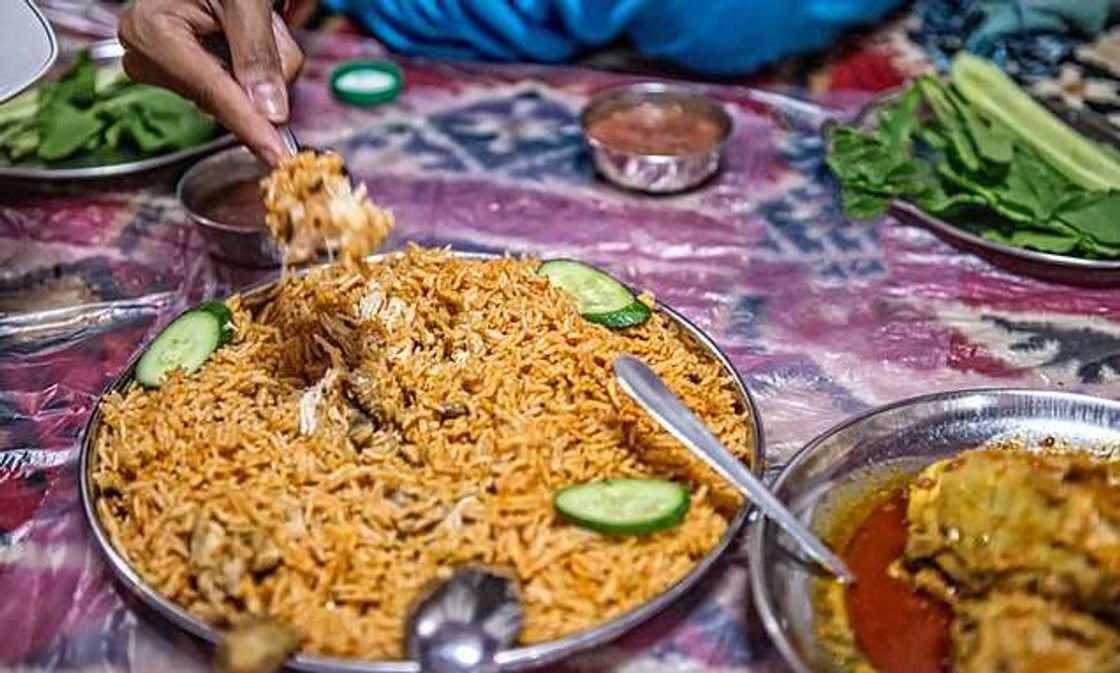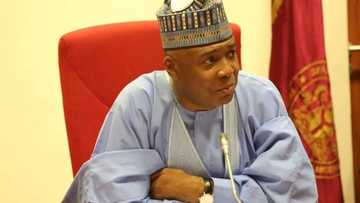Cost of Preparing a Pot of Jollof Rice for Family of 5 In Nigeria Rises by 7.3% to over N8k as Economy Bites
- The cost of making a pot of jollof rice for a family of five has risen by 7.3 per cent to over N8,000 in the first three months of 2022
- This was disclosed in the quarterly SBM Jollof index report for Q1 2022, published by SBM Intelligence
- The growing cost of petrol and food prices were cited as the causes of financial hardship in many Nigerian households
PAY ATTENTION: Click “See First” under the “Following” tab to see Legit.ng News on your Facebook News Feed!
Making a pot of Jollof rice for five Nigerians has climbed from N8,595 to the end of Q1 2022.
This is a 7.3 per cent increase over N8007.50 in the third quarter of 2021.
This was revealed in SBM Intelligence's quarterly SBM Jollof index report for Q1 2022.

Source: Twitter
According to the report, the increased cost of creating jollof is to blame for the country's insecurity, which has hindered food distribution because some food supply lines are regarded unsafe.

Read also
Tariff hike pushes power firms revenue to record high despite no improvement in power supply to Nigerians
Do you have a groundbreaking story you would like us to publish? Please reach us through info@corp.legit.ng!
Part of the report reads:
“The average cost of making a pot of Jollof rice for a family of five went up from N8007.50 in Q3 2021 to N8595 at the end of Q1 2022, a 7.3% increase."
The report also stated that price surges are now a common phenomenon in all the markets as the approach of running to outskirt markets in a bid to save costs is no longer tenable.
Cost by location
The report also showed particularly in Abuja. It will cost the most to make a pot of jollof rice in Wuse II at N10,900 while Bayside Mbakpa in Calabar accounts for the lowest cost of making a pot of Jollof rice at N6,840,” the report revealed.
Nairametrics report revealed that the report shows that traders now call dealers on a daily basis to confirm if there is a price change before they begin the day’s sales because they stand a risk of not being able to replace stocks, as profits are very marginal due to the high cost of goods.

Read also
Young Nigerian man takes photo of people fetching watching in Enugu, wants to sell for over N900k as NFT
A respondent captured in the report stated:
“Beef, chicken, and fish have become so costly these days. I am not even talking about turkey. I removed that one from my menu a long time ago, and now that everybody wants to add egg, it has gone up too. It is now about N80 or N90, depending on whether you buy the small or big one.”
More insight
The report also said that in the North Central, both Nyanya and Wuse II markets experienced an increase in food prices between October and November, a decline in January and an upward trend in March.
Nyanya market, being a market on the outskirts of Abuja had previously been costless than Wuse Market, however, the report revealed that the run to the outskirts does not hold much advantages as costs are roughly the same.
“In these North Central markets, the prices of turkey, beef, and onions increased. The price increase in February and March can be attributed to the fuel scarcity which increased the cost of 8 transportation of goods–some drivers had to spend the night at filling stations to be able to get fuel for their 9 vehicles and others had to buy from black market vendors at higher rates.”

Read also
Elon Musk offers to buy all Twitter shares for N17.8trn in cash, 24hrs after Shareholders accuse him of fraud
The report also added that the Russian invasion of Ukraine is also impacting food prices in Nigeria, citing that the war has led to a global surge in fertiliser prices as shipments from the black sea region have been reduced.
It added:
“Hence, food prices are likely to take an upward trend in the coming months. Already, the cost of a 50kg bag of NPK increased from N8,000 in the previous year to about N17,000 presently.
“A bag of Urea fertiliser now costs N17,000, up from N6,000 last year, thus increasing the cost of food production. While the commissioning of the three million ton fertiliser facility is expected to improve the availability of fertiliser, it may not improve the cost."
Lagos man opens roadside 'mama put' in London
Meanwhile, Legit.ng previously reported that a Nigerian man had opened a roadside eatery in London.
In a short chat with Legit.ng reporter, Azeez said he started the restaurant with one other person, but that he now runs it alone.
Azeez said:
"I'm from Lagos, Surulere. We live in London so we decided to bring food to the city. We were two when we started but now, I'm running myself."
In a photo shared on Twitter by @IamOlajideAwe, some Oyinbo people could be seen as they lined up to buy food from the restaurant.
Source: Legit.ng



